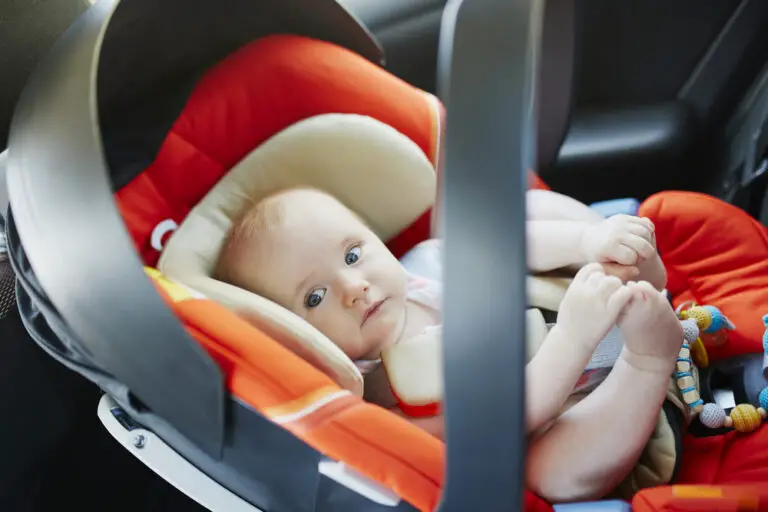Georgia Car Seat Laws 2024 (Rear, Forward & Booster)

Under Georgia car seat laws, all children under the age of 8 years and shorter than 4 feet 9 inches have to be secured in a child restraint. A first violation of the law carries a penalty of maximum $50. A second and subsequent violation will be fined a maximum $100.
Disclaimer: This content does not constitute legal advice. It is solely for informational purposes. Always check the original source of the law for the latest version.
- Rear-Facing
- Forward-Facing
- Booster
- Front Seat
- Seat Belt
- Taxi Seat
- Ridesharing Seat
- Replacement
- Alone in Car
- Choosing a Seat
- Installation Help
Georgia Car Seat Laws
Georgia Rear-Facing Car Seat Law
There is no rear-facing car seat law in Georgia.
As per Georgia child seat laws, a child under 8 years of age and shorter than 4’9” must be restrained in an appropriate child passenger safety system. (1)
While there is no definite Georgia rear-facing child seat law, the Georgia Department of Public Health recommends keeping your child in an infant rear-facing seat till they are at least 1 year old. (2)
The rear-facing car seat age in Georgia is not mentioned in the law. In such a situation, it is better to follow the recommendations of the Georgia Department of Public Health.
Violating the law for the first time will result in a maximum penalty of $50. A second and subsequent offense carries a maximum fine of $100.
Age: Under 8 years
Height: Shorter than 4’9”
Penalty: Maximum $50 for a first-time, $100 for a repeat violation
Georgia Forward-Facing Car Seat Law
There is no definite forward-facing car seat law in Georgia.
According to the car seat laws in Georgia, children younger than 8 years and shorter than 4’9” must be placed in a car seat. (1) It should be appropriate for their height and weight.
In the absence of a Georgia forward-facing child seat law, you can refer to the guidelines of the Georgia Department of Public Health. It recommends keeping children in a forward-facing seat till they reach its maximum limits. (2)
Though the forward-facing car seat age in Georgia is absent, the American Academy of Pediatrics (AAP) recommends that children shift to a forward-facing seat with a harness after they outgrow their rear-facing seats.
A first violation carries a maximum penalty of $50. A second and subsequent offense carries a maximum fine of $100.
Age: Under 8 years
Height: Shorter than 4’9”
Penalty: Maximum $50 for a first-time, $100 for a repeat violation
Georgia Booster Seat Law
According to the child booster seat law in Georgia, children under the age of 8 years or shorter than 4’9” have to be secured in a booster seat that is suitable for their height and weight. (1) It can be a high back or a backless booster seat, depending on your vehicle.
Georgia booster seat requirements do not apply if the child is medically or physically unable to use a booster seat.
The booster seat age in Georgia is not stated. The AAP recommends keeping children in a booster seat till the seat belt fits them properly. This typically happens when they are between 8 to 12 years old.
Violating these Georgia car seat regulations entails a penalty. The first offense carries a maximum fine of $50. A second and subsequent offense carries a maximum fine of $100.
Age: Under 8 years
Height: Shorter than 4’9”
Penalty: Maximum $50 for a first-time, $100 for a repeat violation
Georgia Child Front Seat Law
According to the child front seat law in Georgia, all children less than 8 years old have to ride in the backseat. (1) They can only ride in the front seat in an appropriate child restraint if the vehicle does not have a rear seat or all other rear seating positions are occupied by other kids.
The backseat is the safest riding position for kids. The front seat age in Georgia is 8+ years. However, as per the recommendations of the AAP, you should keep your child in the backseat till they are 13 years old. They must be secured in a child restraint that meets their height and weight requirements.
Disobeying the law can get you a maximum fine of $50 for first offense and $100 for a second and subsequent offenses.
Age:8+ years
Penalty: Maximum $50 for a first-time, $100 for a repeat violation
Georgia Child Seat Belt Law
According to the child seat belt law in Georgia, all children between 8 to 18 years old and taller than 4’9” have to be buckled in an adult safety belt. (1) These requirements must be followed whether they are seated in the front seat or the backseat.
The driver of the vehicle is responsible for ensuring compliance with Georgia children’s seat belt law. If the child is not wearing a seat belt, the driver will be fined a maximum of $25 upon conviction.
Seat belt rules in Georgia are primary laws. This means that law enforcement officials can stop your vehicle and issue a citation if they find that your child is not safely buckled in a seatbelt as per Georgia state law.
Age: 8 to 18 years
Height: 4’9” or taller
Penalty: $25
Georgia Taxi Child Seat Law
According to the taxi child seat law in Georgia, taxis are exempt. They do not have to adhere to child seat requirements in Georgia.
Under the law, a child passenger younger than 8 years or shorter than 4’9” must be in a federally approved car seat. (1) However, the taxi driver is not responsible for providing a taxi child seat in Georgia.
As caregivers, it is best if you arrange an appropriate car seat before traveling with your child in a taxi. Depending on the child’s height, you can select a rear-facing, forward-facing, or booster car seat.
When installing the car seat in a taxi, you must ensure that it is securely fixed. You can refer to the car seat manual or ask the driver for help.
Georgia Ridesharing Child Seat Law
According to the ridesharing child seat law in Georgia, rideshare services are required to follow all child restraint laws. (2) Only taxis are exempt from the law and rideshare services such as Uber and Lyft do not meet the definition of a taxi.
However, the law does not specify who should provide or install a child seat.
In such a case, either the parents/caregivers or the driver should provide a child passenger safety system. For infants, it includes a rear-facing car seat.
For toddlers and young children under 8 years and shorter than 4’9”, a forward-facing car seat with a harness or a belt-positioning booster seat is required. Children taller than 4’9” or older than 8 years should be secured in an adult seat belt.
Georgia Child Seat Replacement Law
There is no specific child seat replacement law in Georgia. But if your car is involved in a moderate or severe accident in Georgia, you must replace the child safety seat. The car seat may have suffered defects that are not visible to the eye. Therefore, it is important to replace them after a moderate or severe crash.
However, if your vehicle suffered a low-impact accident, there is no need to automatically replace the car seat. A low-impact crash is one that satisfies all five conditions prescribed by the National Highway Traffic Safety Administration (NHTSA).
Apart from child seat replacement after an accident, you should also replace it once it has reached past its expiration date as stated by the manufacturer or it has been recalled. Check the seat label for more information.
Leaving Child in the Car in Georgia
There is no law on leaving a child in a vehicle in Georgia. But there are many risks associated with leaving a child unattended in a vehicle. The most common danger is heat stroke.
The temperature inside the vehicle can rise rapidly and children’s bodies heat up faster than adults. This puts them in great danger of suffering a heat stroke. Other risk factors include the child getting kidnapped, setting the car in motion, getting strangled by seat belts or power windows or having some other in-car accident.
Even though leaving a child in the car in Georgia is not technically illegal, the Georgia Department of Driver Services strictly warns against it. You may be charged under serious legal provisions such as child endangerment or neglect.
Choosing a Child Car Seat in Georgia
When choosing a car seat in Georgia, you can follow the NHTSA recommendations.
From the time your child is born till they turn at least 1 year old, a rear-facing car seat is the best car seat to use in Georgia. Once they outgrow it, they can move to a forward-facing seat with a harness.
They should ride in them till they reach the maximum height and weight limits of the seat, as prescribed by the manufacturer.
After they outgrow these, they can use a belt-positioning booster seat. A high back or backless seat is the best booster seat to use in Georgia.
Car Seat Installation Help in Georgia
To comply fully with child restraint laws, child passenger safety seats in Georgia must be installed as per the manufacturer’s instructions.
Correctly installing them can be complicated and many parents end up installing the car seats incorrectly. To help you, there are different stations in Georgia with certified Child Passenger Safety (CPS) technicians. They can check your seat or install it for you. Some of these stations are:
- Hall County Sheriff’s Office
- Marietta Fire Department
- Dunwoody Police Department
- Safe Kids Cherokee County
- Sandy Springs Fire Department
You can find a comprehensive list on the website of Georgia Highway Safety Office.
Georgia Car Seat Safety Resources
- Georgia Governor’s Office of Highway Safety
- Georgia Consumer Protection Division: The Division’s website provides information about the law and how you can buy a car seat based on safety, budget, comfort and other factors.
- Safe Kids Georgia: The Georgia coalition of Safe Kids informs you about the practices in child passenger safety as well as which car seat to use at what age.
- Atlanta Fire and Rescue Department: The Car Seat Program of Atlanta Fire and Safety Department contains all information about the law, exceptions and penalty. It also has a list of other valuable resources on car seat safety.
FAQ
How long should a child ride in a rear-facing car seat in Georgia?
The law is silent. But the Georgia Department of Public Health recommends that a child ride in a rear-facing car seat till the age of 1 year.
Can you put a rear-facing car seat in the front seat in Georgia?
No, you cannot put a rear-facing seat in the front seat in Georgia. You can only put it in front if there is no backseat.
Can you put a rear-facing car seat in the middle rear seat in Georgia?
You can put a rear-facing car seat in the middle rear seat but it must fit properly. Check the car seat as well as your vehicle’s manuals.
When can a baby face forward in a car seat in Georgia?
There is no specific age. But a child can face forward after they have outgrown their rear-facing seat. This typically happens around 2 years of age.
How old for a booster seat in Georgia?
There is no specific age mentioned in the law. But children should ride in a booster seat once they outgrow their forward-facing seat according to its manufacturing limits.
When to use a backless booster seat in Georgia?
You can use a backless booster seat if your vehicle seat has a headrest and the child’s ears are not higher than the seat back.
When can a child sit in the front seat with a booster in Georgia?
A child can sit in the front seat with a booster if they weigh at least 40 pounds and all the rear seating positions are occupied by other children.
When can a child stop using a booster seat in Georgia?
A child can stop using a booster seat when they turn 8 years old or reach 4’9” in height, whichever occurs first. They can then start using the seatbelt.
When can a child sit in the front seat in Georgia?
A child can sit in the front seat after they turn 8 years old or if there is no backseat in the vehicle or they weigh at least 40 pounds and the backseat is occupied by other children.
When to switch from 5 point harness to a seat belt in Georgia?
When the child outgrows the height and weight limits of the 5-point harness, they can switch to wearing a seat belt in a booster seat.
When can a child use a regular seat belt in Georgia?
Under the law, a child can start using a regular seat belt once they are 8 years old or stand at least 4’9” tall (regardless of age).
Do you need a car seat in a taxi in Georgia?
Taxis are not required to have a car seat. However, it is recommended that you carry an appropriate car seat for maximum protection of your child.
Do you need a car seat in a Uber in Georgia?
Yes, you need a car seat in Uber in Georgia. Either you, the caregiver or the driver can provide a federally approved and appropriate car seat.
Do you need a car seat in a Lyft in Georgia?
Yes, you need a car seat in Lyft in Georgia. You or the driver can provide a car seat that is appropriate for the height and weight of your child.

Rishima Rawat
Rishima Rawat is a lawyer and legal writer with over six years of writing and legal experience. She earned her LLB degree from the West Bengal National University of Juridical Sciences, Kolkata. With a passion for child safety, she’s written extensively about the U.S. car seat laws in ParentingMode. She collaborates with businesses and law firms globally, enhancing their online content. Her insights are also published in legal journals like RGNUL, NLIU, and RMLNLU Law Review. Committed to the cause of education, she has volunteered with IDIA, which helps underprivileged children in India to access legal education. She has also worked with Enhelion Knowledge Ventures, a leading legal ed-tech platform in India that provides students with affordable courses in law. Fluent in English and Hindi with elementary proficiency in Spanish, Rishima combines her legal expertise with a dedication to child safety.






